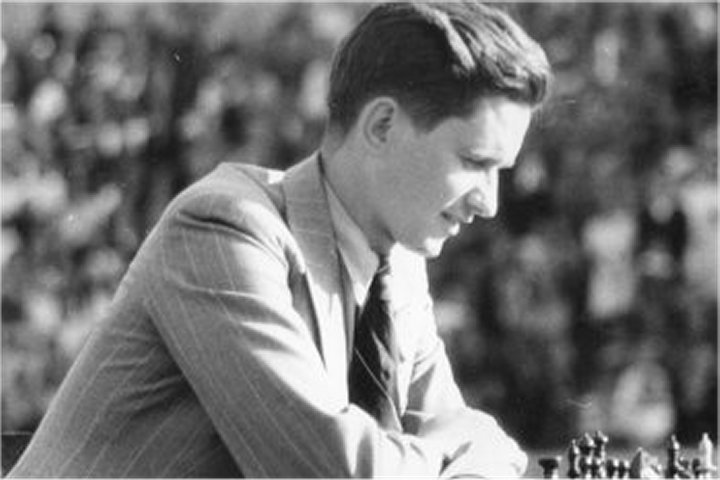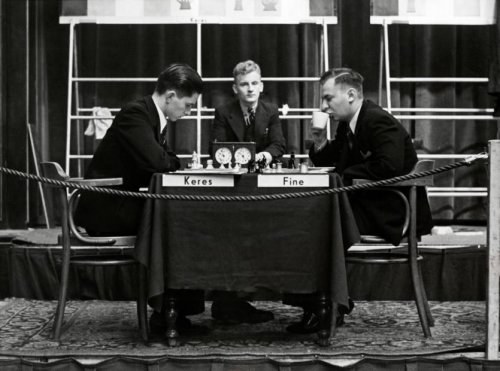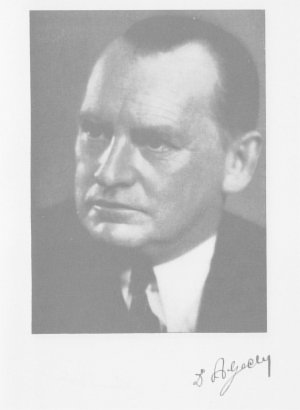


Keres had White against Fine and knew that a draw would give him the biggest success of his young career. After all, Keres had a better Sonneborn-Berger tiebreak than Fine and had also defeated the American in their direct encounter in round seven.
But the game itself did not offer any drama. Fine failed to pose any problems and after mass exchanges in an Open Spanish Fine decided that he could no longer win the game and offered a draw. Keres, of course, accepted to win the tournament.

Keres and Fine fight for tournament victory
World Champion Alexander Alekhine and Mikhail Botvinnik were fighting for third place. Before the round, Alekhine had 6½/13 and was half a point behind Botvinnik who was sole third with 7.0/13. With a victory Alekhine would have leapfrogged Botvinnik and secured third place for himself.
Thus, from the very beginning of their game Alekhine played for a win and indeed managed to build up an attack on the kingside. However, Botvinnik parried all threats and the game finally ended in a draw and Botvinnik finished third.
Salo Flohr and Samuel Reshevsky played the third draw of the round - but here both sides seemed to be satisfied to share the point.
The only decisive game of the round was won by Max Euwe. He won against the indisposed former World Champion José Raúl Capablanca and with this win he scored 5.0/7 in the second half of the tournament, more than any other player had scored in the second part of the tournament.
P. Keres ½-½ R. Fine
A. Alekhine ½-½ Botvinnik
S. Flohr ½-½ S. Reshevsky
M. Euwe 1-0 J.R. Capablanca
The eight best players in the world competed at the AVRO Tournament 1938, and if you look at the final standings, it seems as if a generational change is imminent in the chess world: the winner was Paul Keres, at 22 years of age the youngest player in the field. Second place went to 24-year-old Reuben Fine, the second youngest participant, third place to Mikhail Botvinnik, at 27 the fourth youngest player in the field.
Keres played an impressive tournament and was the only player in the field to remain undefeated. At the beginning of his career Keres amazed the chess world with brilliant attacking games, but at the AVRO tournament he proved to be a universal player who has what it takes to become World Champion.
Fine dominated the first half of the tournament and played a number of fine games but then suffered a setback in the second half and in the end had to content himself with second place.
Fine tried his hand as a chess professional for a while and played numerous tournaments in Europe and the USA during this time, but then decided to pursue a career as a psychologist in the USA - and it is hard to believe that he will reverse this decision despite his good result at the AVRO tournament.
The three World Champions Alexander Alekhine, Max Euwe and José Raúl Capablanca were also the oldest participants of the tournament and they could not keep up with the young players. Alekhine was too inconsistent and only scored 1½ points from his six games against the three leaders Keres, Fine and Botvinnik.

Alexander Alekhine
Euwe was the best player of the second half of the tournament, but the first seven rounds were a disaster for him. However, he managed to score 3½/6 against Keres, Fine and Botvinnik.
Samuel Reshevsky, Fine's big rival in the US, finished with 7.0/14, but when you watch him play you have to wonder how far he could go should he ever manage to cure his time-trouble addiction.
Totally out of shape was Capablanca. He missed a number of good opportunities in his games and finished second to last with 6.0/14, and for the first time in his career did not even score 50 percent. One reason for Capablanca's bad performance was his bad health. For a long time the former World Champion has been suffering from high blood pressure and his doctor had strongly advised him not to play at the AVRO Tournament. Indeed, rumour has it that Capablanca suffered a small stroke during the tournament.
The exhausting mode of the tournament of course suited the younger players. As mentioned before, the players lived in Amsterdam, but had to travel all over Holland to play the rounds in ten different cities. Capablanca, the oldest participant in the tournament, is likely to have been the one who has suffered the most from this grueling schedule.
Salo Flohr also had a disastrous tournament. The reason for this may have been the fate of his adopted country Czechoslovakia: Only a few weeks before the tournament began, Nazi Germany had occupied the Sudetenland which had forced Flohr, who was born in Horodenka in what was then Galicia, and who had lost his parents and six brothers as a child in an anti-Jewish pogrom, to flee from Prague and to become a refugee again.
By winning the AVRO tournament, Keres can hope for a World Championship match against Alekhine, and immediately after the tournament the two agreed to play this match in 1940, which would give Keres time to finish his mathematics studies.
But whether such a match will ever take is uncertain. After all, Alekhine has been negotiating with other participants of the AVRO tournament about a possible World Championship match and he could decide to play against Botvinnik, who is supported by the powerful Soviet Union, where chess has become extremely popular.
However, it is also possible that the tense political situation in Europe will continue to worsen and that there will be no more room for peaceful events such as the AVRO Tournament. Such a development would rob Keres of the rewards of his well-deserved success in one of the strongest tournaments in chess history.